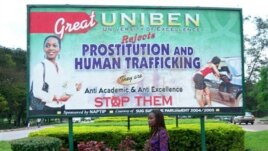
Last updated on: May 30, 2012 6:47 AM
A student at Nigeria's Benin University in Benin City walks past a billboard encouraging women to fight human trafficking.
A new study said much more research is needed on men and children who’ve been victims of human trafficking. It says they’re not getting the medical and psychological care necessary to rebuild their lives.
De Capua report on human trafficking
Dr. Sian Oram said human trafficking is widespread and growing.
“The international level organizations estimate that 2.5 million people are in situations [such] as forced labor as a result of trafficking. And really we see trafficking in every corner of the globe. So there’s about 270,000 people estimated to be in trafficking in industrialized countries, but also hundreds of thousands in sub-Saharan Africa, in the Middle East, North Africa, [and] Latin America,” she said.
Oram led a team of researchers from King’s College London’s Institute of Psychiatry. She said many studies have been done on the physical and psychological effects of trafficking on women.
“The studies were really consistently reporting about women who’ve been trafficked – the sexual exploitation experienced - very high levels of physical and sexual violence. And also we found that they were reporting very high levels of physical, sexual and mental health problems,” she said.
Little is known
Many men become forced laborers in fields or fishing boats. Many children may be recruited into armed groups, sexually exploited or used in the illegal drug trade. Asked how much is known about how they’re affected, Oram said, “Really not very much at all. We didn’t find any studies that reported on the health of trafficked men. And we really only found a couple that reported on trafficked children, and they were very limited.”
Oram isn’t sure why so little is known, but she said it means little is being done to help them.
“I think it really means that when we’re looking to work with trafficked men and trafficked children to support their needs and help them recover from their experiences, we can’t do that in a way that’s informed by the evidence there, because the evidence just isn’t there,” she said.
PTSD
Many trafficking victims not only suffer from high levels of anxiety, but post-traumatic stress disorder. It’s something often associated with combat veterans and war victims. PTSD can have debilitating effects.
“For example,” she said, “if women are talking to police, or they’re completing an immigration interview, and some of the symptoms of PTSD that they may have are around difficulty concentrating, or difficulty remembering important aspects of what happened to them, they may seem like incredible witnesses when actually it’s symptoms of the disorder that they displaying.”
Oram said it’s important to know whether men and children are suffering the same effects.
“I think there’s really a need to prioritize research with trafficked children and with trafficked men. And I think it would be a good idea for researchers to start linking up with organizations that are supporting these people, so that they can start to tap into some of that knowledge that’s already there,” she said.
The study said, “There is no sign that human trafficking is abating.” It says more information is needed to design better interventions to “mitigate the physical and psychological damage associated with this global crime.”


No comments:
Post a Comment